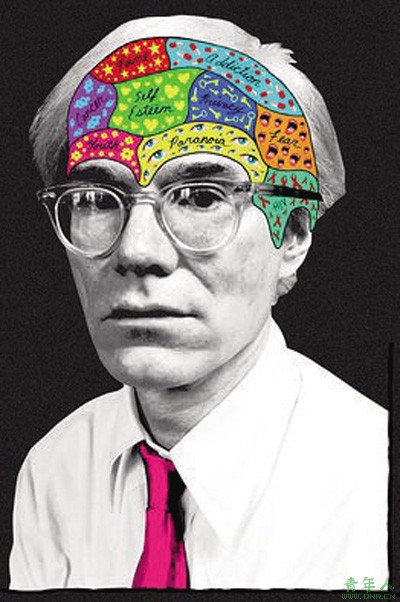
强迫症──焦虑不安、为死亡和年龄而心神不宁、异常敏感和固执己见──听起来是不是很耳熟呢?在健身房里大练块头、被外科医生缝缝补补、注射肉毒杆菌,当代的名人们似乎更像是劫后余生者,而非成功人士。
Doesn’t the hypochondriac-anxious, death- and age-obsessed, hypersensitive and self-absorbed-sound suspiciously familiar? Pumped into lumpy strangeness at the gym, filleted and stitched by the surgeon, embalmed in Botox, our contemporary celebrities look more like survivors than people who are going places.
在18世纪,强迫症几乎成为了时尚,而且被认为是过度奢华和舒适的一个表现。如今,我们似乎已经超越了过去那种把病态地自我关注说成是完美典范的强迫症文化。好莱坞一直以来都充斥着整过的牙齿、隆过的胸部、难辨真假的发际线和缩小的腰围。不过名望也越来越多地伴随着一种近乎崩溃的状态。
In the 18th century, hypochondria became almost fashionable, and was thought to be a symptom of excess luxury and ease. Today we appear to have excelled the hypochondriac cultures of the past by elevating the morbidly self-involved to the level of paragon. Hollywood has long been the land of fixed teeth and busts, blurred hairlines and effaced waistlines. But fame increasingly consists in a state of almost constant near-collapse.
霍华德·休斯似乎为如今强迫症名人们的怪癖和遁世树立了标杆。休斯晚年阴郁的生活──他的独居、自我忽略,再加上他为抵御外部世界而精心安排的种种仪式──是对权力和名望可能付出的代价发出的一次似曾相识的警告。他的传记作家们猜测说,休斯的强迫症从孩童时代母亲对他的健康过份关注的时候就已经开始了。这个听起来有说服力、但无疑过于简单化的解释也被用在了格伦·古尔德的身上。这位钢琴家在音乐会舞台上各种古怪的行为──身穿大衣、戴着围巾演奏,在演奏巴赫乐曲的同时哼唱──也同样表现在他的个人生活里:他惧怕身体接触,还一直保持着详细记录他的(大部分是幻想的)各种病症的习惯。
Howard Hughes seems to have set the standard for today’s hypochondriac celebrities’ tics and reclusion. The grim scenography of Hughes’s decline-his solitary, twilit self-neglect, combined with elaborate prophylactic rituals against the outside world-is a familiar warning about the potential price of power and fame. His biographers have conjectured that Hughes’s hypochondria began in childhood, with his mother’s excessive concern for his health. This tempting and no doubt simplistic explanation has been suggested too in the case of Glenn Gould. The pianist’s manifold eccentricities on the concert stage-playing in coat and scarf, humming along to his own renditions of Bach-were matched in private by his horror of physical contact and habit of keeping a sedulous record of his (largely imaginary) symptoms
在古尔德和休斯身上,强迫症在很大程度上表现为让世界无法靠近自己。如今的名人们似乎是在向人们展现他们的恐惧和病症。当下强迫症文化的一位人所共知的先驱者要算安迪·沃霍尔。由于自己“糟糕身体”的病痛和缺陷,沃霍尔一生大部分时间里都生活在焦虑状态中。这位艺术家的日记里记录着一大堆令他无比困扰的事,其中包括粉刺、脱发、减重、长胖、衰老、癌症、艾滋病和脑瘤。
With Gould and Hughes, hypochondria was mostly a matter of keeping the world at bay. Today’s celebrities seem to advertise their fears and symptoms. The most obvious precursor of our present hypochondriac culture was Andy Warhol, who lived most of his life in a state of anxiety regarding the ailments and imperfections of his ’bad body.’ The artist’s diaries record an array of obsessions, including acne, baldness, weight loss, weight gain, aging, cancer, AIDS and brain tumors.
当代名人们因为药物引发的灾祸通常都是依赖毒品的结果(或者用来掩饰这一点)。然而即使在这种情况下,某种类型的强迫症仍然脱不开干系。处方类止痛药成为最近希斯·莱杰和布莱特妮·墨菲等名人死亡事件中的罪魁祸首也绝非偶然。对我们来说,成功带来的痛苦只能靠麻醉剂来解决听起来似乎也没什么不对。
The medical catastrophes suffered by contemporary celebrities are often, of course, the result of (or deliberate covers for) drug dependence. Yet even here a species of hypochondria is at work. It is no accident that prescription painkillers have featured so tragically in recent celebrity deaths, such as those of Heath Ledger and, allegedly, Brittany Murphy. It seems somehow normal to us now that success brings with it agonies that can only be treated with opiates.
在研究了各种历史上的强迫症病例之后──从查尔斯·达尔文到马塞尔·普鲁斯特──我能够总结的只有这一点:在我们超过了一个临界点之后,对自己身体的过份关注就变成了一种实际上非常危险、甚至是致命的病状。对于某些患者来说,强迫症似乎是保证隐私不受侵犯的一种方式;想想在软木贴面房间里奋笔疾书的普鲁斯特。对自己身体内在的过度关注──不论是由于病痛还是出于让自己变得更好看的迫切要求,能够确保在外部世界取得某种优势。不过,如果没有节制的话,它往往会变成一种病态,而且历史上很少有人像当代的富人和名人们那样拥有这种自残的资源或者机会。
Having studied the case histories of various historical hypochondriacs-from Charles Darwin to Marcel Proust-I can only surmise that there is a point of crisis beyond which excessive concern with one’s body turns into an actually dangerous or even lethal pathology in itself. It seems that for some sufferers hypochondria is a way of guaranteeing inviolable privacy; consider Proust laboring in his cork-lined room. An inward-tending obsession with one’s own body, whether expressed as illness or an excessive urge to improvement, can guarantee certain advantages in the outside world. Unstopped, however, it will tend to the morbid, and few, historically, have had such resources or occasions for self-mutilation as the rich and famous in our century.
我们倾向于将强迫症视为某种自私的表现。强迫症患者仍然声名不佳,他们唯我独尊,对他人真实的痛苦甚至毫不理会。不过心理学家告诉我们说,强迫症通常也是一个组织或者家庭的互动;病人的行为是出于其他人的愿望,这些人出于某种原因需要他或她生病。我们对于某些名人的身体是既敬畏又憎恶,既嫉妒又排斥,除此还能有更好的描述吗?当我们仰慕的名人像古希腊神话中的伊卡洛斯一样坠落的时候,又是什么样的形像可以更好地表现我们对他们的深度关注呢?那些因为职业而让人崇拜的人们或许为了保持年轻和健美付出了努力。他们会为了我们,也会为了我们对自己身体的病态恐惧而继续这样做下去。
We tend to think of hypochondria as a kind of selfishness. The hypochondriac remains a disreputable figure, solipsistic and even immune to the real suffering of others. But psychologists tell us that hypochondria is often also part of a group or family dynamic; the patient acts out the expectations of others who somehow need him or her to be sick. What better description could there be of our attitude-at once awed and repelled, envious and disproving-to the bodies of certain celebrities? What better image of our grisly concern when the heroic patient takes an Icarus fall? The professionally adored may toil to stay youthful and fit. They will be doing it for us, and our morbidly projected fears for our own bodies
责任编辑:sealion1986